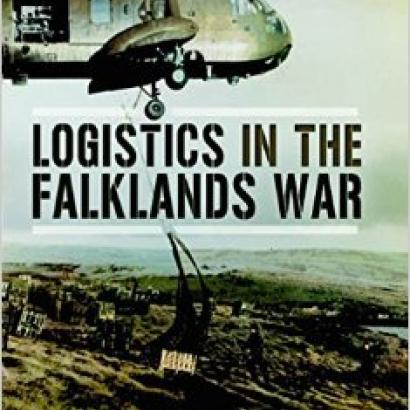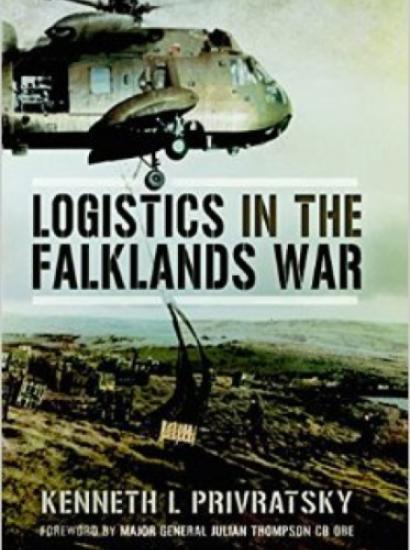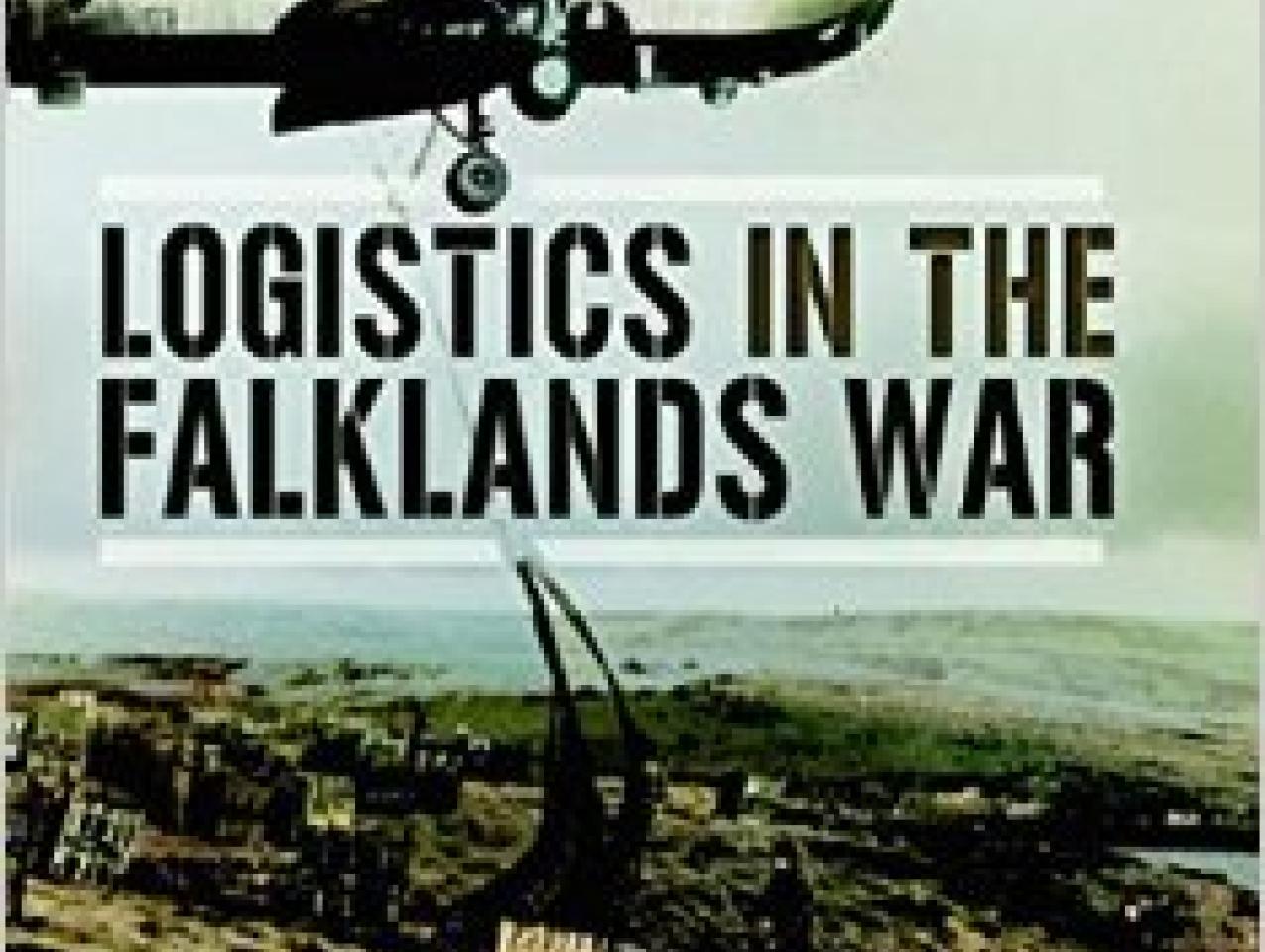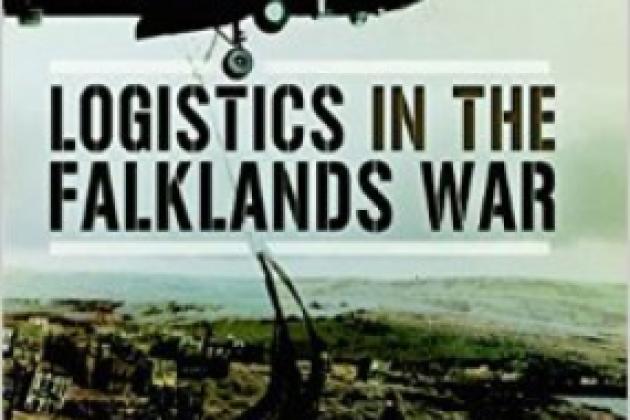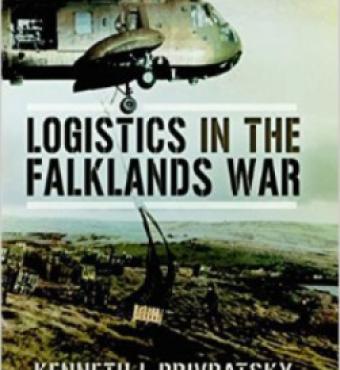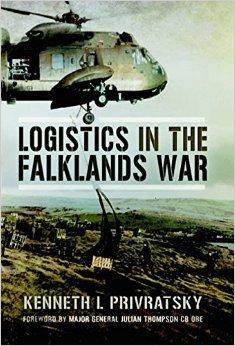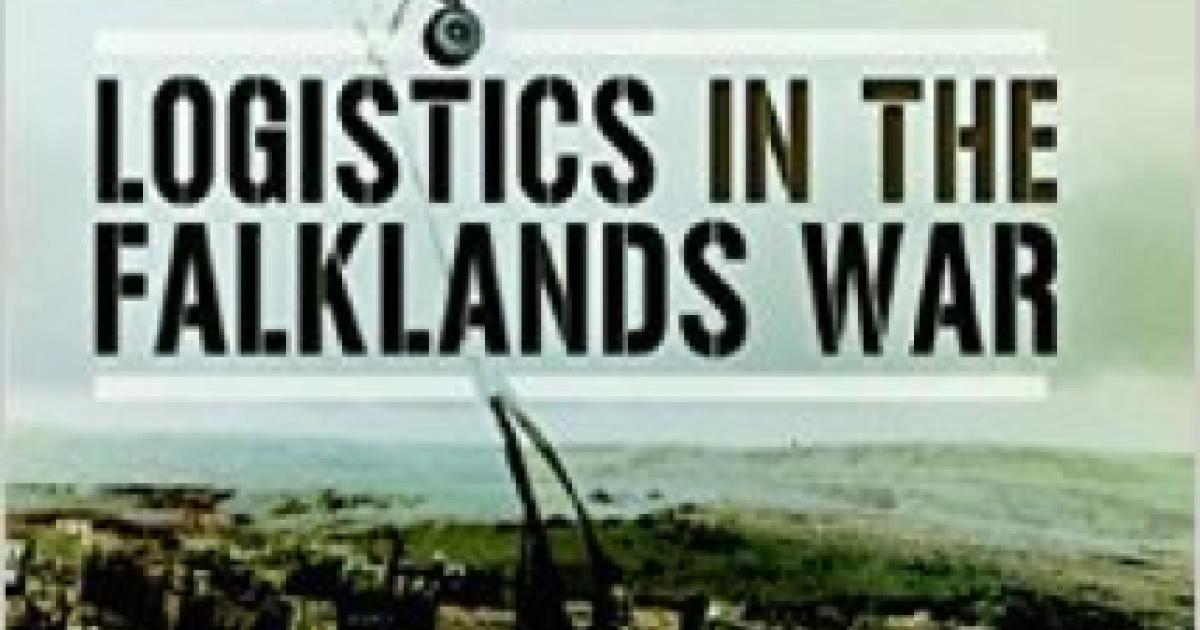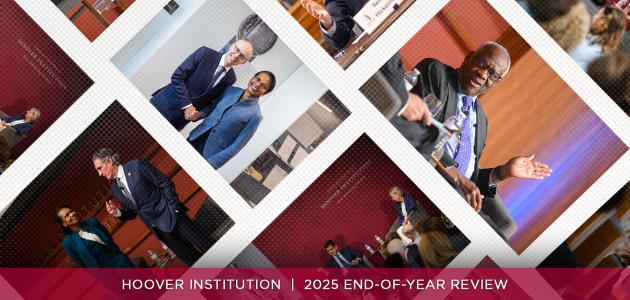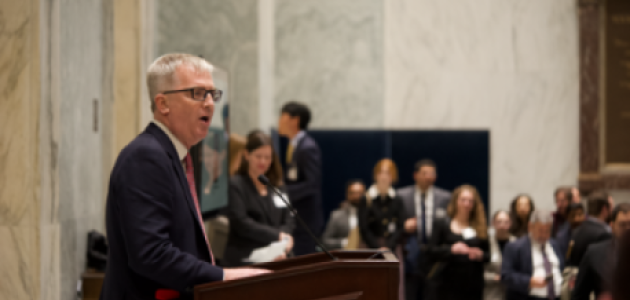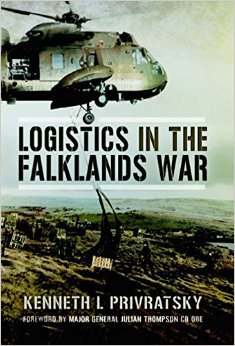
Kenneth Privratsky, a logistics specialist for the army from 1969 to 2002, was a National Security Affairs Fellow (NSAF) at the Hoover Institution from 1991 to 1992. During his tenure, he worked on a book on the Falklands War. After his fellowship, Privratsky was sent on deployment until 2002, when he joined the ocean shipping industry. When he retired in 2010, Privratsky finally had the time and space to finish his Hoover project, publishing Logistics in the Falklands War in 2014 in the United Kingdom and on February 19, 2015, in the United States. Privratsky generously gave his time for an interview with the Hoover Institution about his experience writing the book and as a NSAF in the 1990s.
For more information, see the book’s website and watch the book’s video. Logistics of the Falklands War is now available on Amazon.
This interview has been edited for length.
Hoover: How did you become interested not only in the Falklands War but in the logistics of it? That seems like a particularly unique angle.
Privratsky: Well, it is. In the early ’80s I was stationed in Panama. The Falklands War went down in 1982. I had absolutely no involvement with it, but was in a position where I saw a lot of message traffic so it really grabbed my attention. Then I went to a career development school called a staff college. That was in 1985–86. There were some writing requirements, and they had to have a certain focus. At the time I was a logistician in the military; that was my skill set. Some people fire artillery; I was a logistician. So it was logical for me to examine that war from a logistics standpoint. I wrote two papers on it. There was not much in print at that time, so I wrote letters to some of the British people that I tracked down that fought the war and they were kind enough to respond.
So I used the information they gave me and the little other information I could find and I developed these papers. They were pretty sizable – fifty to sixty pages each. They eventually became included in the curriculum at military schools. . .Then in the early 90s, as you know, I found myself at Hoover. I was then knocking on the door of being a colonel, and again, you have a leader development course at the war college. Most people go to the US Army War College in Carlisle, Pennsylvania, but because I was already stationed in California, they called and asked if I would like to go to the Hoover Institution for my war college. I was there as a military fellow for a year and I dusted off those monographs and I started to expand them into a book.
I had drafted an outline for about ten chapters and I had five or six of them done. And then I kind of lost control of my life because I started getting promoted.
Hoover: Good problem, I guess.
Privratsky: Yes. And then I got out in 2002 and retired in 2010. That is when I started the project. By that time I had made a couple other trips to the UK, so I had a lot of firsthand information, interviews, talking to people that fought that war. Logistics is really kind of a broad subject: it is the supply, it is maintenance, it is transportation, and a whole host of other things that they usually provide if you work for UPS or the military. You provide it so you can sustain other units. It amazed me how the British were able to travel eight thousand miles and eventually fight and win a war when they had nothing down there in that hemisphere, not even a can of beans. And they had no ships to transport the men.
So what they did to pull it together, they requisitioned ships from industry. They ultimately took out more than fifty ships from trade: cruise ships, container ships, a whole variety. And they converted to meet wartime needs. I mean, in a matter of four or five days, to develop the capabilities to deploy forces. And then to sustain them while there. . . a lot of ships got hit by planes. Seven ships were sunk and they were eight thousand miles away, . .They overcame a lot of obstacles, and I was just extremely impressed with what they did. That is why I became kind of attached to the subject. I think it is very unique in the history of warfare.
Hoover: What was the most surprising thing you found in your research?
Privratsky: Well, the most surprising thing was the most obvious thing: how the nation, how the United Kingdom, came together: the government, the military, and industry, to take up ultimately fifty ships from commercial shipping and to convert them in, on average, sixty-eight to seventy-two hours. Literally, to take a swimming pool and cover it with steel planking so a helicopter can land on it. To convert a ship to a hospital ship that used to be a cruise ship complete with beds and medicine. That whole process with over fifty ships. . .was just mind boggling. A lot of Brits I am sure did not agree with the war or they did not like Maggie Thatcher, but our nation has not pulled together like that to meet a military objective since World War II. It was very impressive to me.
Hoover: You were a National Security Affairs Fellow in the early 1990s here at Hoover. How was that experience?
Privratsky: Well, it was a wonderful experience. Tom Henriksen was the guy that ran the program. It was a wonderful experience from a couple perspectives. One, of course, when I was there you had some real blockbuster people. You had George Shultz, you had Milton Freedman, you had Edward Teller. People that have gone down in history as real landmarks. So to be able to meet with them occasionally and listen to their thoughts was really a life-changing experience. It kind of elevated the discussion for me in certain things for the rest of my life. But secondly, it gave me the flexibility to pick up this project that I had started and then develop it to what it became today. . .
At the end of that year you had to give a small presentation on what your research had entailed. And when I did it Edward Teller attended the session. It was a small session. . . but at the end of it here is Edward Teller, he always used to walk around with this five-foot staff, he came up to me after my presentation of the Falklands War and commended me for it being a good and informative discussion. He just kind of grabbed me by the arm and says this is really a rich subject and you really must continue to develop it, hopefully into a book. Now he said that to me in 1992 and I never forgot it. He was quite an inspiration to me.
Hoover: Did your NSAF experience affect the rest of your career with the army, and if so, how?
Privratsky: Very much so. What eventually became in-depth understanding of what went on during that war coupled with my education in the military, it was very instrumental in me seeing things in a different manner. For example, the British were far more advanced in some areas than we Americans were in how they organized their units and provided their logistics. And that was very revelatory to me. Our army eventually migrated a little bit toward the British model and because of my experiences in the war I became a proponent for that. Not everybody in the hierarchy of the Army agreed with it but it eventually became reality in the Army. So to answer your question, I became a proponent for change in the Army based on some things that I had learned from within that framework of the Falklands War.
Hoover: Can you tell me about some of the challenges you faced while writing the book and how you overcame them?
Privratsky: I think that any history has got a certain bias built into it. It is difficult to write something that is unbiased because your sources come at this subject with a certain angle. So as I tried to sort through various things that happened in the Falklands War I inevitably found myself reading many, many books and articles and then talking to people. And they did not always agree on a certain event that happened. So I needed to come to my own conclusion on several areas within the logistics of the Falklands War. And because I was still dialoguing these people I did not want to be forceful in what I had developed to be my conclusion and to alienate them. So balancing the feedback that I got from a lot of people, I think that all authors of history struggle with that. Does that make sense?
Hoover: Yes, makes perfect sense. You mentioned elsewhere that the Falklands War is a useful lesson for difficult logistics in remote wars. What specific lessons do you think the Falklands War can have for US foreign policy in our current remote conflicts?
Privratsky: Well, I am not so sure that it has any great lessons from a foreign policy standpoint. . . From a military standpoint, there is a significant, a wealth of knowledge, that can come from the Falklands War. As you know, as a nation and other nations have been focused on the Middle East for about two decades now. And really what that means is that our men and women have been fighting or supporting over there in the Middle East have been over there for a year, then they fly over there, and they land in an airfield that has got aircraft hangars and ramps and facilities, and ships go in where you have big cranes. And so our military, because of our focus in the Middle East, has really bred a generation of young men and women whose only experience is in operating in very established environments. You with me?
Hoover: Yes.
Privratsky: Now that is quite different than operating in an environment like the Falklands, because not only do you not have any dock where you put the ship up next to, you do not have any roads anywhere in the island in 1982. So we are in the process in the military now of reeducating a generation of logisticians who have never had to deploy very quickly or support their comrades from an austere environment. So that is why I think that my book is going to take a particular hold in military circles, because it has got a wealth of information and good lessons learned in there. And because of that, the first part of April I am going to be back in Virginia talking to the army folks about the significance of that war.
Hoover: Do you think there are specific steps that the military should be taking in the, I do not really want to say reeducation, reorientation of modern military logistics?
Privratsky: Well, I think one of the things that we in the military were trained on in the 1980s, just like the British did, was to be able to rapidly deploy our forces. . . But we have lost that expertise. And so the military is proceeding to reestablish that in its young men and women so that they can regain those capabilities. . . So yes, I think that certainly the ability to deploy forces rapidly, to think about other things that you might otherwise not think of if you find yourself in a remote area and you are thousands of miles away from your depot. . . I think there is a whole wealth of stuff to think about.
Hoover: Do you think modern technology has made logistics for warfare in remote places easier?
Privratsky: Well, in some ways it has. For example, let us just say in a simplistic way, if you needed something. Then electronically we have the capability electronically to transmit requirements very, very quickly. It does not matter where you are. I mean, if you have an iPhone or a GPS or something like that you can get pretty accurate information transmitted to thousands and thousands of miles away. But in 1982 that was not the case. You did not even have a GPS available. You did not even have a cell phone. This was very much an old type of war where technology did not drive things. And so if you needed that flashlight in the Falklands, if it came by ship you would have it in three weeks. If it came by plane you might have it in three days. But at least you could get the required item back there very quickly. But, in many ways, things have not changed.
So, if you are operating at a great distance and you do not plan it correctly and things get broken, your ability to correct them is really dependent on things you do not have. If you lose a ship, for example, you cannot just replace that ship. And so distance adds a lot of different dimensions when a logistician is trying to plan things. . . It is a lot different than the Middle East where a lot of things are prepositioned and there are a lot of warehouses. And if you do not have it you just drive a hundred miles or so and there it is.
Hoover: Interesting, I thought more would have changed. . .You mentioned that you thought the most interesting part of your research was how Britain pulled together as a nation.
Privratsky: Yes.
Hoover: That pulling together is not happening with many of today’s current conflicts. Do you think that kind of national unity is still possible today? And if so, how can it be achieved?
Privratsky: I do not know if it is; I would like to think that it is possible. If an event happens that we would regard as a true emergency for our nation I would like to think that our nation would come together and support certain things. We certainly have in our recent past here. After 9/11 the entire world pulled together to try to find some terrorists. And you may recall that a year later we were chasing them in Afghanistan. At that time, when Afghanistan was a year old everybody in the world was supporting our efforts. So yes, it is possible.
But I do not know. It is certainly not possible in a lot of scenarios because our nation has become tired of continual warfare. We have been in the Middle East now for what, twelve years? So I think it is possible as our national safety is jeopardized but I do not see—I think that we have a pretty divisive government, as you know, and I think there would be a lot of arguing about what we should do and what we should not do right now.
But the British—their position was pretty simple. It was not about sovereignty over the Falklands. Margaret Thatcher’s focus was on how the Falklanders, about eighteen hundred and fifty of them, should have the right of self-determination. They did not want to become Argentine, they wanted to remain aligned with the British. And so that was a strong enough impetus to muster that force and send it down there. The vast majority of British people at the time thought that they should do that. That make sense?
Hoover: Yes, that does. My final question: Any plans for a follow-up book?
Privratsky: Not on that subject. I am contemplating a book on leadership, perhaps with a logistics bias.
In a follow-up email, Privratsky wrote to Hoover that he has indeed started another project but not a follow-up book:
“My ‘current’ project is (believe it or not!) a children's book based on a memorably cute experience with my three grandchildren. Can't tell you any more! The story is set. I am contemplating a path forward for illustrations.”
Hoover: Leadership, that is a big buzzword for today.
Privratsky: Yes, it is a big buzzword. I have had a lot of people that have pushed me to write about it. I have had quite a bit of experience of leading change in organizations, so I have maybe considered putting some of that down.
Hoover: Interesting! We will stay tuned.







